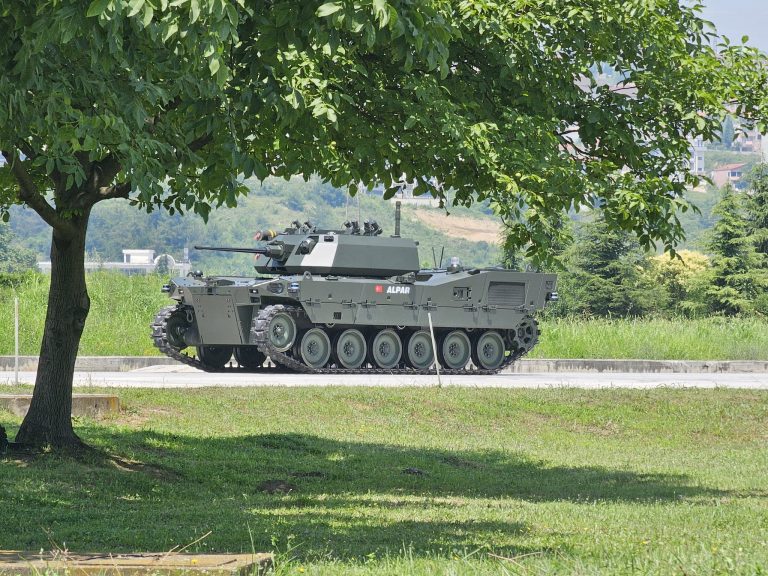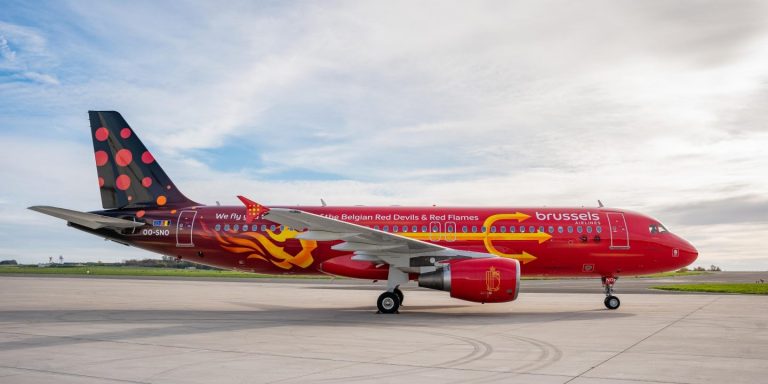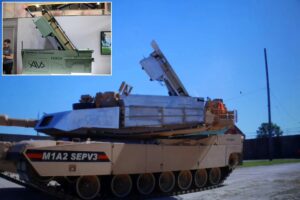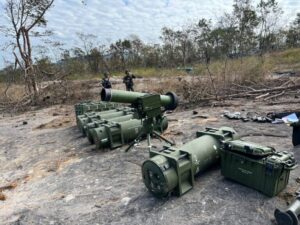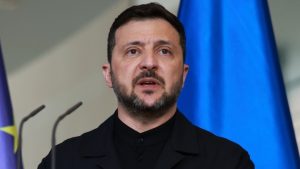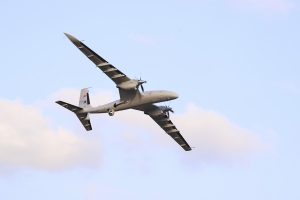Χθες, ο πρέσβης των ΗΠΑ στην Ελλάδα, Τζέφρι Πάιατ, έδωσε σε συντάκτες που ασχολούνται με την άμυνα και την εξωτερική πολιτική μια πολύ ενδιαφέρουσα συνέντευξη, που θα συζητηθεί. Σας την μεταφέρουμε αυτούσια στα αγγλικά και επιφυλασσόμαστε για περαιτέρω ανάλυσή της, καθώς πολλά σημεία ήταν περισσότερα από ενδιαφέροντα.
Ambassador Pyatt: First of all it’s great to see everybody. I’m glad everybody’s healthy and well. I also want to say since we’re on the record what a blessing it is that we’re able to sit outside like this in the beginning of March. We should all be grateful for being in Athens.
I wanted to pull together this group. We work closely with all you guys and I wanted to pull everybody together this morning really to do two things. One, to take the place of what would if we didn’t have COVID have been a VIP Day last week in Alexandroupoli in connection with the big rotation that we just went through, but also to really take stock of where we are in our defense and security relations. Because there’s been a lot of writing on this. You guys have done most of the reporting on it amongst yourselves. And I thought it was really important to recognize both how far we’ve come but also the tremendous ambition that I think exists on both the American and the Greek side to take the relationship even further.
In some ways what we did last week in Alexandroupoli, which was our biggest ever rotation through that part of the country, began four years ago or maybe even a little more than four years ago. You could say it began on the deck of the “Mount Whitney” where I had my welcome reception in October of 2016. But even more, I would go back exactly four years ago because it was the last week of February 2017 that I was up in Thessaloniki along with General Hodges, the then Commander of Army Europe, and General Stefanis for the first rotation that we had done in northern Greece since the wars in Yugoslavia. So it was very much a path-breaking effort on the part of Army Europe and the U.S. government writ large to take advantage of the opportunity we felt we had to think much more ambitiously about our defense and security partnership with Greece and the way we use that relationship to advance our shared security.
O Τζέφρυ Πάιατ στο πυρηνοκίνητο USS Florida που επισκευάζεται στο Μαράθι
I have a visual aid on Thessaloniki because for me the defining memory of that visit is this. This is a bolt and one of the things that happened when we did that rotation through Thessaloniki is that as one of the U.S. Army mechanics was assembling the big propeller blades, these bolts go through the blades to hold them in place. And he had the wrench and he overtightened it and it broke. We had there not just – we had also along with General Hodges, General Piggee, who was the senior Army Headquarters Officer in charge of Rotations and Operations.
I remember the look of horror on everybody’s face when they realized that they didn’t have an extra bolt like this which meant that one of the helicopters was unflyable. And this was right around the Fasching holiday weekend, the beginning of Carnival in Germany. So Germany was shut for a few days, and that was the nearest place that the Army had a warehouse. And so everybody realized that there was a big problem, and General Stefanis said don’t worry I think we can help fix this because it turned out that the Greek Navy’s helicopters, the Sea Hawks, are basically the same platform as the Black Hawk and General Stefanis believed that the Greek spare parts, which were sitting in a Navy warehouse, could be made available.
https://www.ptisidiastima.com/u-s-and-greece-defense-relationship-is-at-an-all-time-high-us-ambassador-pyatt-stresses/
But that was really, it was an illustration of two phenomena. One, we hadn’t done this in Greece for a long time. But two, that we had a fantastic partner in the Hellenic Armed Forces. And if there’s one thing that I am most proud of in terms of what we have done over the past several years in our strategic relationship, it’s the way in which our forces have learned to work together. We have made each other stronger and more secure. That was very much the spirit in which we approached in 2019 the amendment and expansion of our MDCA.
I can share with you that when my new boss, Secretary Blinken, had his first phone call with Foreign Minister Dendias, and I would point out that Greece was in the top tier of foreign minister partners that Secretary Blinken reached out to early in his tenure, the discussion between them could not have been more positive. And I was glad to see that in his interview with Real News over the weekend, Foreign Minister Dendias noted that one of the issues they talked about was the further expansion of our MDCA, and he actually specifically noted that we have the aim of signing an amended MDCA if conditions allow in Athens this fall.
https://www.ptisidiastima.com/fm-dendias-meets-ambassador-pyatt-focus-on-turkeys-illegal-actions/
So this is an undertaking that we are doing because it’s in both of our interests.
We’ve obviously become much more ambitious in terms of the way that our forces work together since the days of that broken bolt in Thessaloniki. We have INIOCHOS which continues full speed ahead and we’re excited to have INIOCHOS 2021 coming up. We have the homeporting of the Hershel Woody Williams in Souda Bay – the first overseas homeporting that the U.S. Navy has done anywhere in the world in five years. We have the deployment of our rotational SEAL teams in Souda Bay which is creating opportunities for our forces to maintain readiness but also building opportunities for really close cooperation with the Hellenic forces and developing capacity on both sides.
We have our ongoing exercises in Larissa and Stefanovikio. I know a number of you a year ago were with me when we flew up to Stefanovikio and Mount Olympus to observe the DV Day in conjunction with last year’s rotations and you saw first of all the fantastic flying of the Hellenic and U.S. Army aviators. One thing I am especially proud of, and we have now completed last week the third of these winter rotations. So this year that we just finished up was the third winter rotation for our combat aviation brigades. I am especially proud of the fact that Army Europe has become steadily more ambitious in terms of both the tempo of operations and the level of interoperability with Greek counterparts. That’s something I want to thank especially General Cavoli, the Commander of Army Europe, and Colonel McDonald and Captain Ketter and I have stayed in close touch with Army Europe throughout this. We had a video a few months ago with General Cavoli and one of the things that he emphasized there was that he was directing his forces to find even more opportunities for interoperations with Greek counterparts.
https://www.ptisidiastima.com/pyatt-describes-another-report-as-fake-news/
So this year you had not just the unilateral exercises and readiness that we were maintaining at Stefanovikio. You had much more complicated exercises. Even with COVID, we were able to create opportunities like the exercises up in Kilkis that you all saw which included night operations and, as a helicopter pilot, Captain Ketter can tell you how much more complicated it is to do these things in the dark. Also you saw our exercises down in the Peloponnese. So we were moving all over Greece using multiple Hellenic Armed Forces counterparts and building opportunities for our guys to work together.
I would also draw particular attention to the way in which we have built up our operational capacity at Alexandroupoli and I know a number of you have been part of our different trips up there. This has been on my part a three-plus-year effort. The indispensable element of it was the removal of the sunken dredger, the Olga, which was funded by European Command and Army Europe specifically to enhance the strategic capabilities of the Port of Alexandroupoli.
A number of you were up in Alexandroupoli with us in July with Minister Panagiotopoulos when we brought the ARC Endurance into Alexandroupoli the first time, the largest ship that had ever entered that port. That visit was very much a proof of concept to see how the port would be able to accommodate these large ships and now we’re delivering results.
One other very important aspect of our cooperation during this period of ramped up engagement has been the way in which we have sought to enhance the capacities of our Hellenic Armed Forces counterparts, and here I want to give special credit to the whole team in the Office of Defense Cooperation. I think sometimes we lose track of everything that’s going on because so much has happened.
https://www.ptisidiastima.com/we-are-collaborating-to-reinforce-greeces-regional-leadership-role/
I would simply note that since I arrived in Greece the U.S. Defense Department has provided more than $250 million in excess defense articles and grant assistance to the Hellenic Armed Forces and Coast Guard. This includes the transfer of 10 CH-47 Chinooks; 70 Kiowas; the 4 Mark-5 Special Operations boats which you’ve seen recently out of Salamis; 1.200 armored security vehicles, M-117s; additional tactical equipment and commo for Hellenic Special Forces units and the Coast Guard Mia including the radios that we just handed over last week.
We also of course in addition to those grants – and again, that’s $250 million provided by the U.S. government, by the U.S. Congress. And I want to single out in particular the very strong support from Senator Menendez. Also on the armed services side Senator Inhofe. We have been very, very fortunate to get the kind of congressional backing that we need to make this relationship as ambitious as it can possibly be. And a lot goes back, again, putting things in context — it was hugely important to get Senator Graham to come here when he did, as the then Chairman of the Senate Defense Appropriations Committee, to see what was happening in Greece and the opportunities – it was actually the Syriza government at that point – were presenting to the United States.
https://www.ptisidiastima.com/us-ambs-remarks-for-elefsina-shipyards-and-new-frigate/
We also, of course, have a very large defense commercial relationship that we continue to build on. That again during the past four years has included the F-16 upgrades, engine upgrades for the Chinooks, modernization of Greece’s P-3s, and the commitment to acquire MH-60 Romeo helicopters. And I should point out in particular that the modernized P-3s and Romeos will give Greece one of the most advanced maritime domain awareness and anti-submarine capabilities in the Mediterranean. And it will further enhance NATO capabilities.
Then of course something I’m sure you all will want to talk about when we get to it is the pending acquisition of the new frigates and the F-35s which we are ready to sell when Greece is ready.
Let me talk a little bit before I conclude here about coming attractions. As I said, I wish I could have been up in Alexandroupoli with all of you last week. We were glad to have the ARC Endurance coming back, welcoming the 1st Combat Aviation Brigade back to Greece as part of Operation Atlantic Resolve and I think Torrey has handouts for all of you guys with the fact sheets on Atlantic Resolve. I want to thank all of our partners who made last week’s rotation possible. That includes, of course, the HNDGS, the General Staff, the 12th Mechanized Division and Chairman Chatzimichail at the Alexandroupoli port. And the community of Alexandroupoli which has been fantastically welcoming to our forces.
The operation last week was particularly complicated because it was the first time that we used Alexandroupoli simultaneously for both a departure and an arrival. So some of the photographs that you saw, the helicopters for instance on the runway at the Alexandroupoli Airport, those were elements of the 101st which used Alexandroupoli as the gateway for their exit from Greece at the same time that the ARC Endurance was unloading the equipment from the 1st Cab. And together we were deploying and redeploying approximately 70 helicopters, including Black Hawks and Apaches, and 600 pieces of equipment and vehicles through the port of Alexandroupoli.
I will just say, I was up in Thessaloniki probably about three years ago when we did a rotation about half that size and it basically took up the entire pier, for those of you who know the Thessaloniki pier. So I would emphasize, 70 helicopters and 600 pieces of supporting equipment is a lot of stuff and we could not have done it without the outstanding support including on security from both the Hellenic Armed Forces and the port management. And this was all part of building on the investment that we made with the removal of the Olga and the arrangements which we agreed upon through the expanded MDCA.
https://www.ptisidiastima.com/ambassador-pyatt-announces-u-s-campaign-to-commemorate-greeces-bicentennial/
I want to emphasize also, I was very glad to see that in the HNDGS tweet on the 101st rotation out, they noted specifically how this rotation was one of the benefits to Greece from the expansion of the MDCA in 2019. And I’m not going to pick on Angelos in particular, but I would just emphasize because I know you wrote a story recently that talked about Greece is looking for benefits from the MDCA. What I hear from my most senior Greek government counterparts is Greece gets a lot of benefits from the MDCA and that is well understood by the political leadership. This is not a transactional relationship, that that’s not how our alliance works. That this is a matter of converging strategic interests and Greece’s strategic interests are served by our cooperation that is happening under the expansion that happened in 2019.
I’ll finish up on Alexandroupoli with just a couple of points. The U.S. interest in Alexandroupolis obviously goes beyond our military and security cooperation. We are very serious about the U.S. Development Finance Corporation and their commitment of interest to the privatization of that port and the associated port of Kavala. You all have seen the tweets that came out on Minister Georgiadis’s telephone video conversation two weeks ago with Dave Marchick, the current head of DFC. I would note that that was the first engagement that Dave Marchick had with any international counterpart, and he was very clear in that engagement that DFC is committed to Greece, is committed to its operations in Greece, and in fact is looking to grow that portfolio and that cooperation even further.
https://www.ptisidiastima.com/orio-sti-diastravlosi-tvn-diloseon-pay/
Alexandroupoli is particularly strategic because of its location, because of the link to the floating regassification unit and a series of other energy infrastructure projects at that location including the plans for a gas-fired power plant which is part of Greece’s replacement of a dirty coal power with cleaner LNG and gas-fired power. The IGB connection with Bulgaria which is key to unlocking the GAZPROM monopoly on Bulgaria and the energy coercion effects that come from that. It is a key arrival point for energy infrastructure equipment including wind power. And it is connected as well to the plans for the Kavala underground gas storage facility.
So Alexandroupoli is not just a defense and security logistics hub, it’s also an energy security logistics hub.
We’re very glad that we have two strong U.S. bidders among those who have expressed interest – Black Summit and Quintana — and we are very hopeful that they will come out at the top of that project.
In the meantime, we are full speed ahead on the FSRU. I was particularly pleased to see even over the past few days news of further progress on North Macedonia’s investment in the FSRU so this is a project which now will be invested by Greece, by Italy through its subsidiaries, by Bulgaria, and by North Macedonia. So very much a strategic energy integrator. And it’s something that illustrates very well Greece’s role as a catalyst to greater regional cooperation and energy integration.
Finally, and here I’ll stop so we can get to questions. We will be back to Alexandroupoli several more times this spring and summer in conjunction with Defender Europe 21. This is a very large U.S. Army and NATO exercise that will involve approximately 30,000 U.S., allied and partner forces from 26 nations conducting simultaneous operations in more than a dozen nations.
This is the big summer exercise series for Army Europe. Typically one year is on the northern tier, the next year is on the southern tier. This year is on the southern tier and it’s very much consistent with what Tim and I have been discussions with General Wolters in European Command which is a very systematic focus on NATO’s southeastern flank and how to develop our capacities, our partnerships, our flexibility and responsiveness in this strategically important domain.
Defender 21 is still in the planning stages and we anticipate a public announcement with more details in mid-March and activities beginning in April. But I can promise you we will be back in Alexandroupoli and we will be back there in a big way.
I will leave the frigates discussion for questions and answers because I know somebody will ask about it. But let me say just to finish up, how proud I am personally of the work that the embassy team has done, of the support that we have gotten from our interagency back in Washington. And I would note we’ve got a lot of partners in this effort. Secretary Blinken and his team, to include Derek Chollet in the Counselor’s Office, are extremely familiar with what we’ve been doing to build the strategic relationship with Greece. Derek, who was a partner in the Obama administration, spent the past four years at the German Marshal Fund. He knows everything that we’ve been doing out here. Likewise on the NSC side, Cara Abercrombie who is the new Senior Director for Defense at the White House, is somebody who we’ve all worked with including in her past capacity in the Pentagon’s Defense Security Operation Offices. So there’s a very strong network of people in the new administration who are committed to this alliance, committed to this relationship.
https://www.ptisidiastima.com/den-tithetai-thema-apostratikopoiisis-amerikanos-presvis/
Then we have outstanding support as I said from Congress including importantly the new Chairman of the Senate Foreign Relations Committee who so far has been batting 1000, which is an American baseball term, but has been at every occasion has used his hearings to lay a marker on Greece and the Greece relationship. He did so yesterday in the confirmation hearing for Wendy Sherman, as our new Deputy Secretary of State, and Brian McKeon, as Deputy Secretary for Management. And he did so as well in the earlier confirmation hearing for Secretary Blinken. So he’s keeping a close eye on the work that we’re doing here as well.
I’ll finish up there. Happy to take any questions that you want, and again, thanks for coming out and joining us on this beautiful morning in Athens.
Question: My question is about what we call the intermediate solution. I talk about used ships from U.S. armed forces which are let’s say for the Greek, for the Hellenic Navy in order to progress an agreement probably with the American support, the MMSC frigates. Do you have any further information about this?
Ambassador Pyatt: Thank you for the question and I will say three things. First of all, we are very committed to our Navy to Navy partnership with Greece. You saw that last week in everything we were doing with the Hydra while she was in the 5th Fleet area of operations and I was glad to see exercises both with 5th Fleet forces in the Persian Gulf and also with U.S. Coast Guard elements in the Persian Gulf. We want to see the Hellenic Navy be as capable as possible because that makes NATO stronger. This is something Tim and I had the opportunity earlier this week to have a secure video conference with the new Commander of Naval Forces Europe and Africa. He’s somebody who has served in this part of the world, knows the Greece relationship very well, and shares our commitment to continuing to deepen that relationship.
We recognize that the Greek government now needs to make a very large decision in terms of how to update and modernize its naval capabilities.
https://www.ptisidiastima.com/hellenic-us-c130-flight-over-athens/
The MH-60 Romeos are part of that. The P-3 upgrades are part of that. The Mark-5s for the Special Forces are part of that. So we are already demonstrating our commitment to enhancing Greece’s naval capabilities. The next big step is going to be the frigates. This is a big decision for the Greek state. It’s a sovereign decision that Greece is going to make.
My understanding from talking to the Minister of Defense, to the Prime Minister’s Office, is that there will three criteria that Greece is going to have to make a decision on. One is the platform, the capabilities of the ship itself; another is the contribution to the Greek defense industry and the Greek economy. Specifically, the prospect of using an expenditure of billions of euros to revive Greek shipbuilding to the levels it once had. And the third is, as you said, the famous interim solution.
I remain very confident that the United States package approach to those three issues is going to be second to none.
The U.S. Navy has an operational and highly capable product to offer the Hellenic Navy which is backed by a government to government agreement and a strategic partnership with the U.S. Navy. We are not just selling metal. We are selling a platform which we believe will help to further enhance a strategic relationship between our two navies.
We also are confident, I am confident, that Lockheed Martin, which is the U.S. company that’s involved here, will have an unbeatable offer in terms of their readiness to manufacture locally. The U.S. Navy has already had a team which came out here during the summer, visited Elefsina and Skaramangas and concluded that those shipyards with substantial new investment had the capacity to manufacture the MMSC and the U.S. proposal as discussed with the Greek government at that time was to manufacture one MMSC probably in the United States and three here in Greece. I have not heard any of our competitors make a similar explicit offer.
https://www.ptisidiastima.com/uss-hershel-woody-williams-maybe-coming-to-greece/
Then there’s the question of the interim solution. I will assure you based on conversations that I have had with U.S. military and naval leadership that the U.S. Navy is looking very hard at this interim solution and recognizes that this is going to be an essential element of the Greek decision because the interim solution is what fills the gap when the MEKOs are taking offline for upgrading. Again, that’s part of the proposal that Lockheed Martin is making.
We are not able to come to the table with a specific interim solution until we receive the non-binding LOR from the Greek government. I know Vasilis has written about this, I know Angelos has written about this. All you guys keep saying it’s coming in a couple of days. I hope you’re right. But we have not received it yet. But that is what will unlock the process on the U.S. side.
We recognize that this has to go through a bureaucratic process in Greece but we also have emphasized that this is completely non-binding. It implies no obligation from the Greek state to ask the U.S. Navy for a proposal that addresses this ship.
Meanwhile Lockheed Martin even without the LOR is continuing its work. You all have the fact sheets that Lockheed Martin has put together regarding the capabilities and options available with the MMSC platform. What I would emphasize is the flexibility that Lockheed Martin has emphasized to me. And they will have a team back here in Greece next week to conduct commercial conversations including with management at Elefsina and Skaramangas. So that private sector aspect of this is continuing. But the government to government side is waiting for the LOR for LOA.
Question: If I may add to this question, you said in your initial statement that you are ready to sell F-35s as well. So could you a little bit describe what exactly this means? Is there a timetable of things that the Greek side should do in order to start such a process?
Ambassador Pyatt: I think it really is what I said. When the Greek government decides that it is ready to begin this investment, the U.S. government has indicated that we are eager to cooperate with Greece in this regard.
An F-35 is a very complex system. It’s not a matter of just calling up Lockheed Martin and saying do you have one that we can buy and you can deliver next week. That’s why the Viper upgrade program is so important, because it begins to develop this generation 4.5 capacity in terms of operations, in terms of networking, in terms of pilots. And then you are looking at a multi-year process once Greece decides that it wants to acquire the F-35. Lockheed Martin has said about five years from contract to deployment.
U.S. Defense Official: The U.S. government has said about five years. Because there’s a lot of unique infrastructure that has to go in to support the aircraft. We’re having our own challenges in the UK to get that infrastructure in place. So it’s not simply flying an F-35 and parking it next to an F-16.
Ambassador Pyatt: But this is something I’ve discussed on multiple occasions with the government, with Minister Panagiotopoulos. The message from the U.S. government side has only been positive.
Question: You said something about Elefsina and Skaramangas shipyards.
Ambassador Pyatt: Right, and I know you’ve been down there a lot and you’ve seen what we’re doing there.
Question: So what we know is that ONEX and DFC are planning to invest over there in Elefsina shipyards half a billion dollars. On the other hand, there is ongoing procedure about the Skaramangas shipyards. Having learned that there is a strong [inaudible] in Greek government of building the Greek frigates in Skaramangas, would DFC and ONEX express interest in purchase of Skaramangas as well? Would your government support a consolidation by ONEX, a consolidation plan by ONEX?
Ambassador Pyatt: Let me break that into a couple of pieces, and I would think about the issues as separate.
We are prepared, the U.S. Navy has determined that either Elefsina or Skaramangas are capable of supporting MMSC construction but that it will require substantial injection of capital to get to that point. The two privatizations have been extremely complicated and this doesn’t surprise me at all. I lived through the Syros shipyard saga. I traveled there first I think in the summer of 2017. Minister Georgiadis likes to talk about the miracle of Syros, and in many ways it is a miracle. And I know that when I was working on this with Minister Pappas and others in the Syriza government, they were not opposed, it’s not that they didn’t want it to move ahead, but it took a huge amount of bureaucratic and political energy to cut through all of the issues of overhanging debt, different claims, legal claims against the shipyard operation, the various obligations to the state including taxes, utility payments, all the rest. And I will give Minister Georgiadis great credit for being the one who came and sliced through the Gordian Knot to make Syros come back to life.
Both Elefsina and Skaramangas are even more complicated, and as the transactions have moved ahead, that’s become even more clear. It’s reflected in the fact that you have so far an initial failed tender for Skaramangas. It’s reflected in the discovery of additional debts around Elefsina, which has made the business plan for Elefsina’s revival more complicated, less bankable as it were.
I think the DFC interest is, in my mind, secondary to the question of how the future of these shipyards relates to the frigates tender. That is the frigates tender is so large that if the government, if we can do this right, the frigates tender can be the catalyst to the revival of either one of those shipyards, but there are a whole lot of associated business issues that I’m not competent to speak to.
I know Minister Georgiadis has been very clear with me and with everybody in the U.S. government that his focus is the revival of the Greek shipbuilding industry, and he wants to use the frigates tender to enable that project. And as I said, as far as I’m aware, Lockheed Martin and the United States is the only bidder at this point that has developed a serious vision for doing that.
Some of our competitors have made noises about local industrial cooperation, but they haven’t made the specific commitment that the U.S. has which has been communicated both officially, government to government, but also private sector to private sector to manufacture ships in Greece.
Question: I would like to ask you about MDCA. How does the U.S. plan to update, to deepen this agreement? What will be the key priorities for the U.S.?
Ambassador Pyatt: The most important thing is we’re going to do it jointly with Greece. This is not an instance where we have a set of demands that we are imposing on Greece. We want to work with the Greek government. It’s exactly as Foreign Minister Dendias said in his Real News interview. We are doing this together. In fact I have to go back and check the transcript but I think in the phone call with Secretary Blinken, I think it was Minister Dendias who actually raised MDCA first. This is something that Tim and I have discussed on multiple occasions with the Defense Minister, with the Foreign Minister, with the CHOD. Everybody wants to do this.
There are two categories of work that we have talked about. One is extending to a multi-year arrangement. And frankly, the main reason for that is bureaucratic. We are very good in the U.S. government at generating paperwork and if the Greek government wants to keep doing an annual renewal, we can live with that. But I think everybody has concluded that’s a waste of time and effort and it also misses the opportunity.
There’s an expression in the United States, “nobody has ever taken a rental car to the car wash.” The same thing applies to a multi-year MDCA. If we have a multi-year program somewhere it makes it easier in our system to think about longer term investments.
And I would emphasize, we have demonstrated results already. If you look at the three facilities that we have added to the MDCA in 2019, we have made specific tangible investments in all three locations – in Alexandroupoli, in Larissa, and Stefanovikio – which are useful to U.S. operational requirements but also enhance the facilities which are available to the Hellenic Armed Forces. And without exception when we make these investments we’re doing it on a joint basis.
So a multi-year MDCA enhances the opportunities for those kinds of investments.
We’ve also talked about additional facilities that might be brought underneath the umbrella of the MDCA. I know some of you, I think Angelos, one of your stories talked about 20 different facilities. We’re not going to use 20 facilities in Greece, I’m confident of that. That’s why we’re having this negotiation. To figure out what are the additional facilities which would be most useful to American forces to have as operational rotational platforms. And we are not looking at permanent presences. These are temporary and rotational appearances.
So that’s where we are on that. And the specific facilities is something that we’re going to talk about in this government to government negotiation and I fully endorse the Foreign Minister’s proposal that we should finish this work by the fall for signature, and I also know having been involved in the negotiation of the 2019 amendments, that there’s only going to be goodwill on both sides from the political level to get this done.
Question: Can I follow up? This will be on a ministerial level or on a bureaucrat level? Will there be any meeting? I mean person to person meeting between Ministers of Foreign Affairs, Ministers of Defense? Top level?
Ambassador Pyatt: It’s going to begin at the bureaucratic level. I know that there is nothing that Secretary Blinken wants to do more than get on the road and start traveling and meeting with his counterparts. COVID has been a huge impediment to that. You’ve seen that he’s been doing a lot of virtual engagement. So we don’t have anything specific planned at this point.
But the first work is going to be done at the bureaucratic level anyway, and that’s already starting and we are having those conversations which in Greece involves both the Ministry of Defense and the Ministry of Foreign Affairs. And then on the U.S. side it involves both the Embassy and the Pentagon and the State Department’s PolMil bureau. So we’re all working together on this.
The amendments that we will work on – as in 2019, we are not talking about a new MDCA. We’re talking about amending the current MDCA to reflect the realities of our cooperation. And again, I think the most – if there’s one thing that I hope everybody will take out of today, it’s the sense of the four-year arc and how far we’ve come in this relationship and how what we’re doing now is about institutionalizing the dramatic progress that we’ve already achieved. And as Secretary Blinken said to Foreign Minister Dendias, taking it even further.
Question: May I ask about the U.S.-Turkey relationship and Greece-Turkey relations? I haven’t heard about Turkey so far so I am eager to hear from you the view of the new U.S. administration about Turkey.
Ambassador Pyatt: The good news is I’m responsible for the relationship with Greece. I think on Turkey I will just restrict myself to saying we very much support the efforts that Prime Minister Mitsotakis, Foreign Minister Dendias, the Greek government are making to get the exploratory talks, or keep the exploratory talks back on track. As we understand it, now the ball is in Ankara’s court to answer the Greek proposal for a second round of exploratory talks here in Athens, and we much prefer the current situation to what we were all living through in August.
Question: There is, if I may have a follow-on. Someone who watches the situation should realize that Turkey’s blackmailing not only Greece but other countries in the EU and other bigger countries except from the Europeans, and Greece is showing self-discipline. So what should we wait from our allies such as the Americans?
Ambassador Pyatt: Again, I’m not going to speak in detail to our Turkey policy. I will note that Secretary Blinken’s comments on Turkey have been very clear in his confirmation hearing and in the statement that was published after his initial call with Foreign Minister Çavuşoğlu. Beyond that, the United States supports the measures that the Greek government is taking to further its Turkey policy.
Question: My question is more on energy diplomacy since we started talking about politics. And since you praised Alexandroupoli as an energy hub, let me ask about Eastern Mediterranean because there has been a proposal of el-Sisi to the Greek Prime Minister asking whether the pipeline of East Med should change the route. Instead of Cyprus, to go through Egypt. I was wondering if you know about this, if you were informed about this, and what’s your point of view on that?
Ambassador Pyatt: I think on all of these issues of pipelines and routes, the person to ask is the market. The market is going to decide which or these options is viable. I think the thing that’s most important to me, and we highlighted this when Secretary Pompeo traveled to Thessaloniki in September, is the way in which just as there has been a dramatic transformation of Greece’s defense relationship with the United States over the past four years, this period has also seen an extraordinary change in Greece’s role as an energy security provider to all of southeastern Europe. Greece has become an indispensable partner for the United States in helping to build energy resilience and diversity across southeastern Europe through the TAP pipeline, the IGB, the FSRU, Revithoussa, the gas connector which is moving ahead with North Macedonia. All of these projects. The fact that you have countries like Serbia committing to contracts for the FSRU shows you the regional impact that Greece is having. And the same applies to the conversations with the countries of the Eastern Med including Cyprus, Egypt and Israel.
I would emphasize, obviously one of the things that has changed dramatically with President Biden’s administration is a huge focus on renewable energy options. Greece agrees with that 100 percent. This was something we talked about with Prime Minister Mitsotakis in December when Energy Secretary Brouillette was here. So even in the Trump administration. And I have made the point publicly that I only see our energy cooperation accelerating as the United States returns to the Paris Agreement, as we begin to focus on doing more on climate sustainability, more on renewable energy options.
This all fits perfectly with what the Greek government is doing with the Prime Minister’s commitment to close lignite power. The work that we are doing with DFC, and one of the things I should emphasize is that when Dave Marchick spoke to Minister Georgiadis, one of his specific requests was, and we are following up on this, for Greece to come to DFC with proposals for additional projects that would advance our clean energy options. So renewable and other projects that would allow DFC to do even more in Greece with that focus.
So I don’t know whether any of these pipelines are ever going to be built. As I said, that is a decision for the markets. I think it’s also very interesting that you’re seeing an enhanced conversation now about not just moving BCMs of gas but also moving electrons, electricity interconnectors. And I think you’re going to see more of that as well. But we see Greece as really playing a leading role on this and it’s definitely an area where I again see converging interests between Greece and the United States.
Question: Coming back to defense. What France says is that it we will lease to Greek Armed Forces any weapon system we produce, for example Scalp Naval, Meteor, etc. What about U.S., for example, Harpoon missiles for aircraft? SM-2. If we go on with the MMSC frigates. Can you say the same?
Ambassador Pyatt: We have never said no to anything from Greece that I’m aware of, but let me let thee guys answer you, specifically on Harpoons and these other things.
U.S. Defense Official: The way that our system works is we only give what the customer wants. We’ve had and continue to have detailed discussions with the Hellenic Navy about the capabilities they want on the ship today, but then also potential for future upgrades.
That’s where we are. We don’t offer anything that the customer doesn’t ask us to discuss, and we do that government to government.
So I will say that we will, as the Ambassador said, whatever the Hellenic Navy asks for, we will do our best, to run it through our process. And we have a very successful track record of saying yes to Greece and to all our partners. We don’t want to say no. But that’s where we are on the talks with the Hellenic Navy. It’s really them telling us what capabilities they want and they need on whatever ship it is, and then we do our best to meet that request.
Question: So you are saying yes to Harpoon missiles for aircraft? As I know, the Hellenic Air Forces had sent a request about this weapon.
U.S. Defense Official: I can’t talk about specific requests but again, we have a demonstrated track record of answering positively to what the armed forces ask from us.
Question: For the future. Does President Biden want to visit Greece? Is it in his plans?
Ambassador Pyatt: The last time I saw President Biden was actually here in Athens in 2017 when he visited for a private conference. I know he is very committed to our relationship. I have not had any conversations with the White House about travel plans at this point. But I can assure you that he and his administration are very strongly committed to our strategic relationship and everything that we’re doing out here.
Question: I remember when we met in Syros that the shipyards over there were being certified by the 6th Fleet. So I’m aware that the U.S. Navy has done the same in Elefsina for the frigate program. Do you confirm that?
Ambassador Pyatt: I confirm that the U.S. Navy has concluded that with additional capital investment Elefsina would be capable of producing the MMSC and one of the benefits that would come with that if the MMSC is manufactured in Elefsina/Skaramanagas, is that that would bring with it the additional capacity to provide maintenance and support to the LCS.
Is that correct?
U.S. Defense Official: Yes, sir. Exactly. So the parent design for the MMSC is the FREEDOM Class. So it would be a natural fit for a place in Greece as the U.S. Navy deploys that ship in the future to Europe because the FREEDOM Class is going to the European theater and the other (INDEPENDENCE) class is going to the Pacific. So there would be a natural place that would be able to service our U.S. Navy’s LCS ships as well in Greece.
Ambassador Pyatt: Again, thanks to everybody for your attention to these issues. Torrey’s always available for any follow-ups that you’ve got. I would encourage everybody to be in touch as we continue on this and what I would emphasize is this is a relationship which for both governments is strategic and certainly for the United States. It’s about building capacity, it’s about building partnerships, it’s about building security in the wider region. And we’re only going to go upward from where we are right now.
Thank you.
